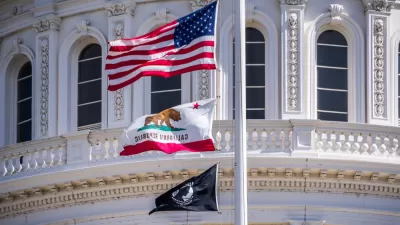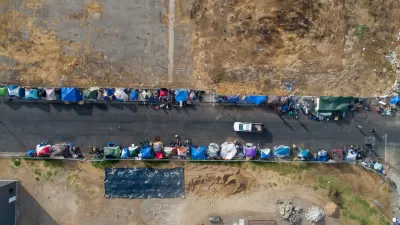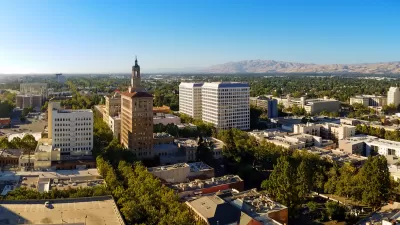In a commentary published in The Mercury News, Mayor Matt Mahan describes a shelter and law enforcement approach to ending targeted homeless encampments within Northern California's largest city.

The unsheltered homeless landscape in the Western United States was transformed last summer after the Supreme Court overturned the Ninth Circuit's Martin v. Boise ruling of 2018. As a result of Grants Pass v. Johnson, shelter availability was no longer a requirement for a city to ban camping on public property.
Unlike some California cities that have banned shelter construction, San Jose is committed to providing housing for its homeless population. “In the next year, San Jose will bring online over 1,000 new quick-build housing units and shelter beds for the homeless,” writes Mayor Matt Mahan in the introduction to his commentary published in The Mercury News on March 7.
But what happens when campers reject public shelter offers? Mahan writes that this has become a problem, noting that these individuals represent a “subset of people who are 'service resistant' — unwilling to come indoors due to an addiction, mental health issue or personal preference.”
Recently, over 30% of the inhabitants of an encampment along Great Oaks Boulevard refused new individual interim [aka transitional] housing units with private bathrooms and kitchenettes — a trend we’re seeing across several new sites.
Enforcement policy proposal
Mahan wants the city to adopt an enforcement policy to deal with campers who refuse the shelter offer, essentially codifying the landmark Supreme Court ruling.
That’s why I am proposing that our city embrace enforcement as a necessary tool for achieving our goal of moving everyone indoors. To do so, we need to update city policy to enforce trespassing laws against those who repeatedly refuse shelter. Enforcement should escalate from warnings to citations to, ultimately, arrest for repeated violations of our municipal code, including refusing shelter, tapping city electrical lines and camping in no-camping zones.
Joyce Chu, who covers homelessness and equity issues in Santa Clara County for the San José Spotlight, reported on March 6 that Mahan “unveiled his 'Responsibility to Shelter' initiative Thursday, where homeless people who choose not to accept shelter after three attempts within an 18-month period will be subject to arrest for trespassing.”
The goal is to send people to the behavioral health court system and compel them to get treatment. If adopted by the full San Jose City Council during the upcoming budget process, the policy would only apply to homeless people living near new shelters.
The court system is known as CARE Court [pdf], short for the name of the state legislation, Community Assistance, Recovery and Empowerment Act, signed by Gov. Gavin Newsom in September 2022.
[See the CARE Court subheading in the October 18, 2023 news post, "Election 2024: California Voters to Decide on $6 Billion Homelessness Bond," which narrowly passed on the March 2024 ballot.]
FULL STORY: Mahan: San Jose homeless have a responsibility to the community, too

Planetizen Federal Action Tracker
A weekly monitor of how Trump’s orders and actions are impacting planners and planning in America.

Congressman Proposes Bill to Rename DC Metro “Trump Train”
The Make Autorail Great Again Act would withhold federal funding to the system until the Washington Metropolitan Area Transit Authority (WMATA), rebrands as the Washington Metropolitan Authority for Greater Access (WMAGA).

The Simple Legislative Tool Transforming Vacant Downtowns
In California, Michigan and Georgia, an easy win is bringing dollars — and delight — back to city centers.

The States Losing Rural Delivery Rooms at an Alarming Pace
In some states, as few as 9% of rural hospitals still deliver babies. As a result, rising pre-term births, no adequate pre-term care and "harrowing" close calls are a growing reality.

The Small South Asian Republic Going all in on EVs
Thanks to one simple policy change less than five years ago, 65% of new cars in this Himalayan country are now electric.

DC Backpedals on Bike Lane Protection, Swaps Barriers for Paint
Citing aesthetic concerns, the city is removing the concrete barriers and flexposts that once separated Arizona Avenue cyclists from motor vehicles.
Urban Design for Planners 1: Software Tools
This six-course series explores essential urban design concepts using open source software and equips planners with the tools they need to participate fully in the urban design process.
Planning for Universal Design
Learn the tools for implementing Universal Design in planning regulations.
Smith Gee Studio
City of Charlotte
City of Camden Redevelopment Agency
City of Astoria
Transportation Research & Education Center (TREC) at Portland State University
US High Speed Rail Association
City of Camden Redevelopment Agency
Municipality of Princeton (NJ)





























